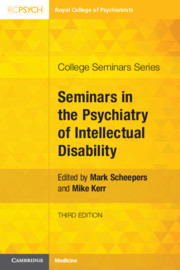Book contents
- Seminars in the Psychiatry of Intellectual Disability
- College Seminars Series
- Seminars in the Psychiatry of Intellectual Disability
- Copyright page
- Contents
- Contributors
- Section 1 Understanding Intellectual Disability
- Section 2 Co-morbidity
- Section 3 Psychiatric and Behavioural Disorders
- Chapter 9 Children with Intellectual Disabilities and Psychiatric Problems
- Chapter 10 Adults with Intellectual Disabilities and Psychiatric Disorders
- Chapter 11 Management of Dementia in Intellectual Disability
- Chapter 12 Forensic Psychiatry and Intellectual Disability
- Chapter 13 Psychotherapy in People with Intellectual Disabilities
- Chapter 14 Psychological Treatment of Common Behavioural Disorders
- Chapter 15 Challenging Behaviour and the Use of Pharmacological Interventions
- Section 4 Delivering High-Quality Care
- Index
- References
Chapter 12 - Forensic Psychiatry and Intellectual Disability
from Section 3 - Psychiatric and Behavioural Disorders
Published online by Cambridge University Press: 14 January 2019
- Seminars in the Psychiatry of Intellectual Disability
- College Seminars Series
- Seminars in the Psychiatry of Intellectual Disability
- Copyright page
- Contents
- Contributors
- Section 1 Understanding Intellectual Disability
- Section 2 Co-morbidity
- Section 3 Psychiatric and Behavioural Disorders
- Chapter 9 Children with Intellectual Disabilities and Psychiatric Problems
- Chapter 10 Adults with Intellectual Disabilities and Psychiatric Disorders
- Chapter 11 Management of Dementia in Intellectual Disability
- Chapter 12 Forensic Psychiatry and Intellectual Disability
- Chapter 13 Psychotherapy in People with Intellectual Disabilities
- Chapter 14 Psychological Treatment of Common Behavioural Disorders
- Chapter 15 Challenging Behaviour and the Use of Pharmacological Interventions
- Section 4 Delivering High-Quality Care
- Index
- References
- Type
- Chapter
- Information
- Seminars in the Psychiatry of Intellectual Disability , pp. 147 - 157Publisher: Cambridge University PressPrint publication year: 2019



